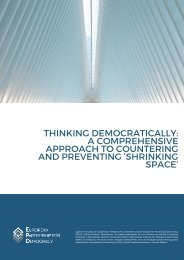Repression and resilience: Diagnosing closing space mid-pandemic
You also want an ePaper? Increase the reach of your titles
YUMPU automatically turns print PDFs into web optimized ePapers that Google loves.
REPRESSION AND RESILIENCE: DIAGNOSING CLOSING SPACE MID-PANDEMIC<br />
15<br />
(Guatemala). In El Salvador, the armed forces <strong>and</strong> the<br />
national police arbitrarily <strong>and</strong> illegally detained many<br />
thous<strong>and</strong>s of people, who were locked up in large<br />
overcrowded internment camps called “containment<br />
centres”, where the virus spread rapidly. The practice<br />
was maintained for months before it was forcibly<br />
stopped by a decision of the Constitutional Court. Such a<br />
strong military presence went alongside a propag<strong>and</strong>a<br />
campaign about the importance of the military in public<br />
life. As the researcher in El Salvador stated, “even though<br />
these measures are not anti-democratic per se, their<br />
military implementation <strong>and</strong> the subsequent decrees<br />
stretched constitutionality to the limit.”<br />
The unchallenged role of the military poses many<br />
other risks, most importantly to fundamental freedoms<br />
<strong>and</strong> civil liberties. In Guatemala, for instance, the<br />
state of siege allowed the security forces to dissolve<br />
demonstrations <strong>and</strong> public meetings without a warrant,<br />
making community organising <strong>and</strong> political opposition<br />
particularly challenging. In countries with a history of<br />
military rule, like Indonesia, the military’s re-emergence<br />
in public <strong>and</strong> political life is a threat to democracy itself.<br />
The p<strong>and</strong>emic was seen as an excellent opportunity to<br />
legalise such re-emergence.<br />
Excessive police force<br />
The deployment of security forces in several countries<br />
across the globe to enforce emergency law <strong>and</strong> support<br />
the measures imposed to control the spread of the virus<br />
has been accompanied by the increasing militarisation of<br />
law enforcement <strong>and</strong> excessive police brutality. The UN<br />
High Commissioner for Human Rights, Michelle Bachelet,<br />
reported shortly after the outbreak of the p<strong>and</strong>emic on<br />
an excessive use of force by police <strong>and</strong> other security<br />
forces to implement emergency measures. 27 The<br />
emergency nature of deployment implies in some cases<br />
a weak control over security forces’ behaviour, <strong>and</strong>, as<br />
a consequence, more room for abuse <strong>and</strong> corruption. 28<br />
Amnesty International documented cases in 60<br />
countries in all regions of the world where authorities - in<br />
particular police forces or other agencies carrying out<br />
law enforcement functions - committed human rights<br />
violations in the name of tackling the virus. 29 Human<br />
Rights Watch reported that military or police forces have<br />
used excessive, <strong>and</strong> at times lethal, force - with apparent<br />
impunity - in at least 18 countries while enforcing COVIDrelated<br />
measures. Other violations included firing live<br />
ammunition at peaceful protesters, beating them, <strong>and</strong><br />
assaulting them while in detention. 30<br />
The case studies provided similar evidence for an<br />
increase in police brutality. At its most extreme, Ug<strong>and</strong>a<br />
allowed for capital punishment for the disregard of<br />
certain COVID measures. Over 50 people died – <strong>and</strong><br />
many more were injured – between March <strong>and</strong> November<br />
due to police enforcement of COVID-19 measures, <strong>and</strong><br />
many journalists were arrested <strong>and</strong> attacked. In these<br />
cases, the oppressive actions of security services likely<br />
reinforced long-st<strong>and</strong>ing resentment against the state,<br />
distrust towards security forces <strong>and</strong> inter-communal<br />
tensions. 31<br />
27 United Nations (2020): COVID-19: Exceptional measures should not be cover for human rights abuses <strong>and</strong> violations (speech Bachelet).<br />
Available here.<br />
28 According to Transparency International, in many countries police officers <strong>and</strong> soldiers are dem<strong>and</strong>ing bribes from people who pass<br />
roadblocks, stay out past curfew, <strong>and</strong> want to leave quarantine centers. More information available here.<br />
29 Amnesty International (2021): COVID-19 Crackdowns: Police Abuse <strong>and</strong> the Global P<strong>and</strong>emic. Available here.<br />
30 Human Rights Watch (2021): COVID-19 Triggers Wave of Free Speech Abuse. Available here<br />
31 International Alert (2020): COVID-19: Security forces must stop using violence <strong>and</strong> be part of the solution. Available here. See also: Al<br />
Jazeera (2021): “The problem with army enforced lockdowns in the time of COVID-19”. Available here; E-International Relations (2020): Human<br />
Rights <strong>and</strong> Democracy A<strong>mid</strong>st Militarized COVID-19 Responses in Southeast Asia. Available here; <strong>and</strong> Mani, K. (2020): “The Soldier Is Here to<br />
Defend You: Latin America’s Militarized Response to COVID-19”. Available here.

















